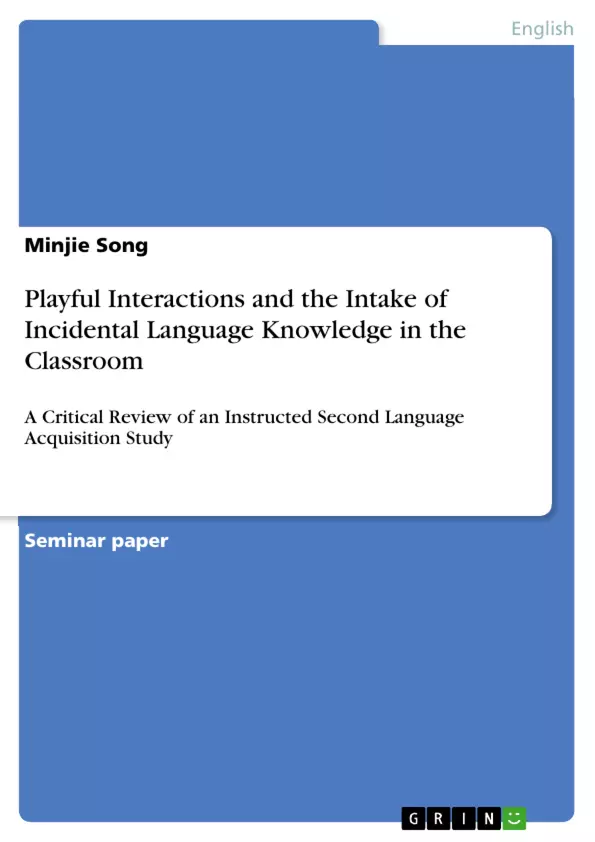My paper will illustrate the researcher´s (Nick Ellis) attempt to uncover the interplay of classroom humor, learners’ interaction, and incidental learning and explore how reliable and valid her study is in answering her research question. The second part of this paper discusses the theoretical basis of the study. The third part introduces the research design along with my reflections upon its upside and downside. Lastly, I will conclude with a discussion on the implication of the study and provide areas of further consideration for future studies on this topic.
Based on theories of psycholinguistics on how L2 learners could better internalize their target linguistic knowledge, this paper is a critical review of a resent instructed second language acquisition study on the different effect of playful and nonplayful incidental vocabulary learning during classroom instruction. This paper lays out a solid theoretical basis for the issue in focus, including a summary of studies on playful instructions and the role of incidental focus on form. The strengths and weaknesses of the target research are then discussed, from the perspective of its data collection and coding methods, and resluts analysis.
Table of Contents
- Introduction
- Theoretical Basis
- Cases of Humor Studies in ISLA and Psychological Research
- The Role of Interaction and Playful Interaction
- Incidental Focus on Form
- A Critical Introduction of the Empirical Study
- Information about the Research Site and Participants
- Data Collection and Coding Methods
- Description
- Reflections
- Post-test Results and Statistical Analysis
- Conclusion
Objectives and Key Themes
This research paper examines a non-interventionist quasi-experimental study in instructed second language acquisition (ISLA), aiming to determine whether playful classroom interactions can enhance incidental learning of second language (L2) features by learners. The research focuses on the interplay of classroom humor, learner interaction, and incidental learning within a real classroom setting, seeking to understand the effectiveness of existing playful interactions in promoting L2 acquisition.
- The role of humor and playfulness in promoting L2 acquisition
- The significance of interaction and incidental learning in the classroom
- The effectiveness of non-interventionist research methods in ISLA
- The application of psycholinguistic theories to understand L2 learning processes
- The potential of humor as a facilitator of language acquisition
Chapter Summaries
- Introduction: This chapter introduces the research question of how L2 learners internalize linguistic systems, highlighting the importance of classroom learning and the focus of ISLA studies. It discusses the role of psycholinguistics in understanding language processing and the use of non-interventionist quasi-experimental research in observing and measuring the effectiveness of classroom learning activities.
- Theoretical Basis: This chapter reviews relevant literature on humor, interaction, and incidental focus on form in ISLA, providing a theoretical foundation for understanding the study's approach. It discusses how humor can be both a means and an end to L2 learning, drawing on psychological research on the memorability of humorous items.
- A Critical Introduction of the Empirical Study: This chapter introduces the research design of the study, including information about the research site, participants, data collection methods, and post-test results. It provides a detailed description of the study's methodology and reflects on its strengths and limitations.
Keywords
This research paper explores the application of psycholinguistic principles to instructed second language acquisition (ISLA). The paper focuses on key concepts such as humor, interaction, incidental learning, non-interventionist research methods, and the memorability of humorous items. It examines the effectiveness of playful classroom interactions in promoting the intake of incidental L2 knowledge.
Frequently Asked Questions
Can humor improve second language (L2) learning?
Yes, research in Instructed Second Language Acquisition (ISLA) suggests that playful interactions and humor can enhance the intake of incidental language knowledge by making linguistic features more memorable.
What is „incidental learning“ in the classroom?
Incidental learning occurs when students acquire linguistic knowledge (like vocabulary or grammar) while their primary focus is on communication or a specific task, rather than formal study.
What does „playful interaction“ mean in this context?
It refers to classroom interactions involving jokes, puns, or lighthearted exchanges between learners and teachers that create a positive emotional atmosphere for learning.
How does psycholinguistics explain the effect of humor?
Psycholinguistic theories suggest that humorous items attract more attention and are processed more deeply, leading to better internalization of the target language features.
What are the challenges of researching humor in ISLA?
Challenges include the difficulty of objectively measuring humor, the need for non-interventionist designs in real classrooms, and the complexity of coding spontaneous interactions.
- Citation du texte
- Minjie Song (Auteur), 2020, Playful Interactions and the Intake of Incidental Language Knowledge in the Classroom, Munich, GRIN Verlag, https://www.grin.com/document/947534



